English to Italian translation services:
AI-powered and
culturally precise
Scale your business across Italian-speaking markets with AI-powered English to Italian translation tailored to match regional dialects and business contexts. From software interfaces to marketing campaigns, Transifex delivers native-quality Italian localization that maintains your brand voice while meeting ISO standards for professional translation services.
Book your 30-min demo

Book your 30-min demo

Reach 85+ million Italian speakers with enterprise-grade localization
Italian is a Romance language spoken by over 85 million people worldwide and drives Europe's fourth-largest economy. Whether you're targeting Italy's sophisticated consumer market, Switzerland's Italian-speaking regions, or the vibrant Italian diaspora across the Americas and Australia, quality English to Italian translation directly impacts your market penetration and revenue growth in Italian-speaking communities.
Why English to Italian translation requires expert precision
Converting English content to Italian involves complex grammar structures, cultural nuances, and regional business conventions that can significantly impact your message effectiveness in Italian-speaking markets.
Here's what makes professional Italian translation challenging:
Complex grammatical structures
Italian nouns have masculine and feminine genders that affect all related articles and adjectives. The language also has a complex verb system with multiple tenses and the subjunctive mood commonly used in business communication. Sentence structure is flexible, allowing different word orders, which makes cultural context important. The choice between formal "Lei" and informal "Tu" also changes tone and dynamics in professional settings.
Regional market differences
Standard Italian, based on the Tuscan dialect, is used for business across Italy, Switzerland, and San Marino. Swiss Italian requires specific cultural adaptation, while regional dialects within Italy feature distinct vocabulary and references. Business etiquette also varies between Northern and Southern Italy, influencing messaging approaches.
Cultural adaptation requirements
Italian consumers place high value on sophistication and quality, with most preferring understated, reasoned claims over bold marketing language. Relationship-building is central, requiring time and trust through consistent brand messaging. Design and aesthetics standards are exceptionally high, and Italy’s strong family orientation also shapes B2C messaging and purchasing behavior.
Technical localization hurdles
Italian translations often expand text length by 15 to 25 percent compared to English, and color symbolism in design can affect user experience. Legal compliance requirements differ between Italy, Switzerland, and other Italian-speaking regions. Preferences for currency formats and measurement systems also vary across markets.

Transifex is loved by leading organizations worldwide
English to Italian translation at enterprise scale with Transifex
Whether you manage localization projects, develop software, or run marketing campaigns targeting Italian-speaking markets, Transifex streamlines your English to Italian translation workflow without compromising quality or cultural authenticity.
Here's what makes the difference:
AI that understands Italian language variants
Transifex AI recognizes Standard Italian (it_IT), Swiss Italian (it_CH), and regional variants following ISO 639-1 and BCP 47 standards. The system automatically adapts vocabulary, formality levels, and cultural references based on your target market—using "cellulare" for mobile phone in Italy while adapting to "telefonino" in different regions automatically.
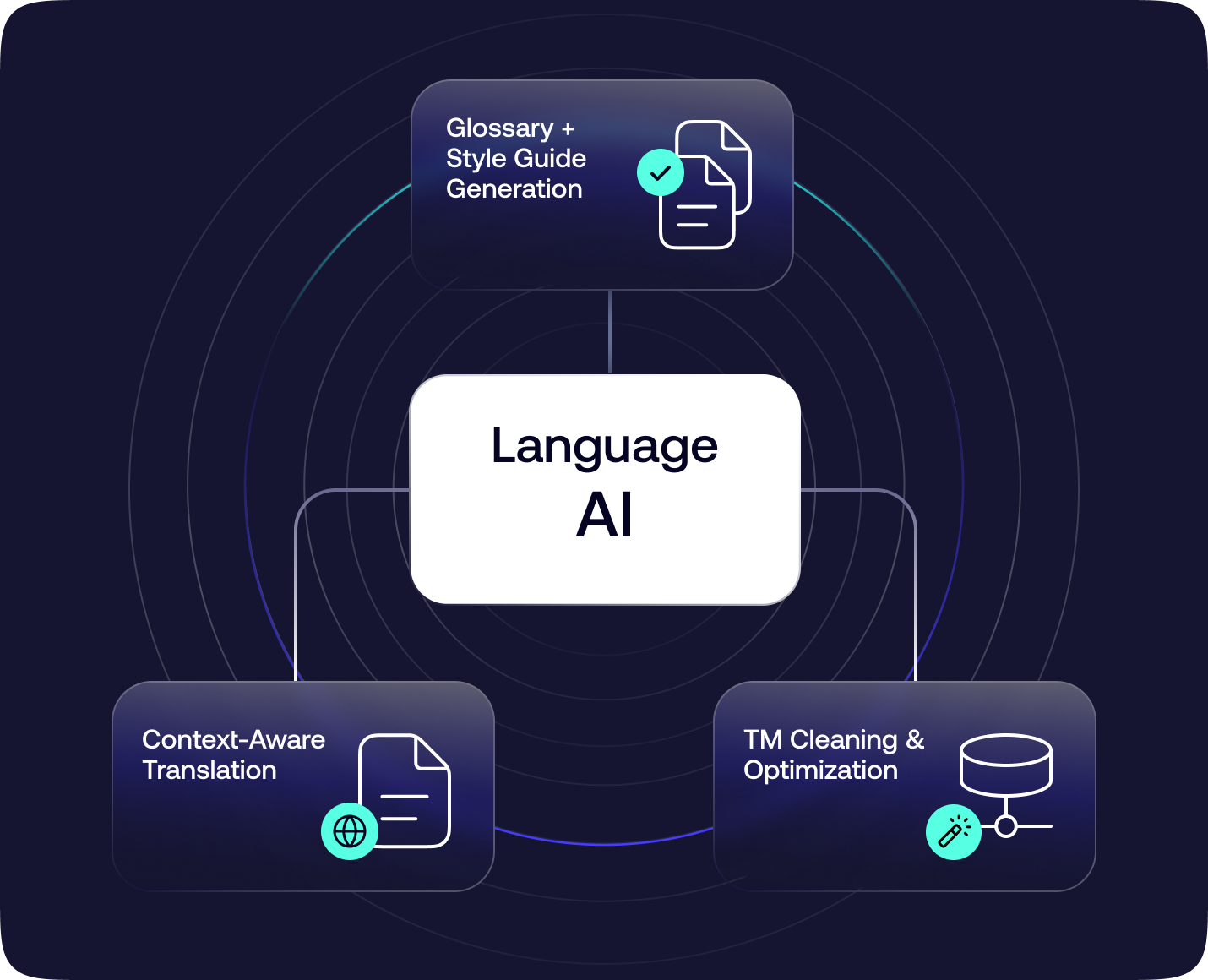
Translation Memory built for Italian complexity
Every approved Italian translation builds your terminology database using ISO/IEC 15897 standards for locale handling. When you translate "customer support" once as "assistenza clienti," the system suggests it consistently across all Italian variants while respecting regional differences. Fuzzy matching identifies similar grammatical structures to accelerate translations while maintaining linguistic consistency.
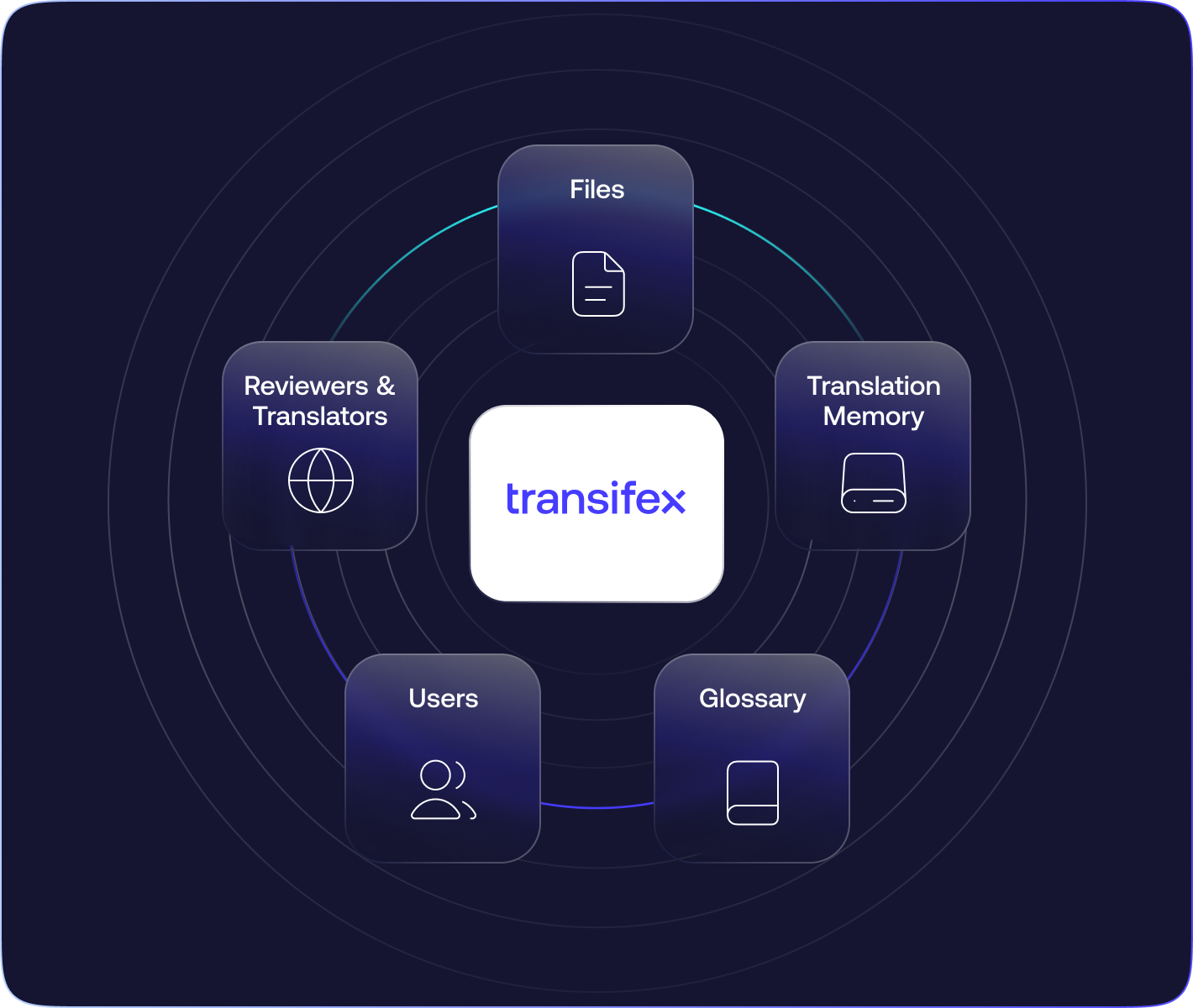
Quality scores you can trust
TQI (Translation Quality Index) automatically evaluates every Italian translation using three metrics: consistency across language models, structural integrity preserving HTML tags and grammatical gender agreements, and semantic accuracy. Set thresholds to auto-approve high-quality translations (85%+) while flagging complex Italian grammar issues for human review.
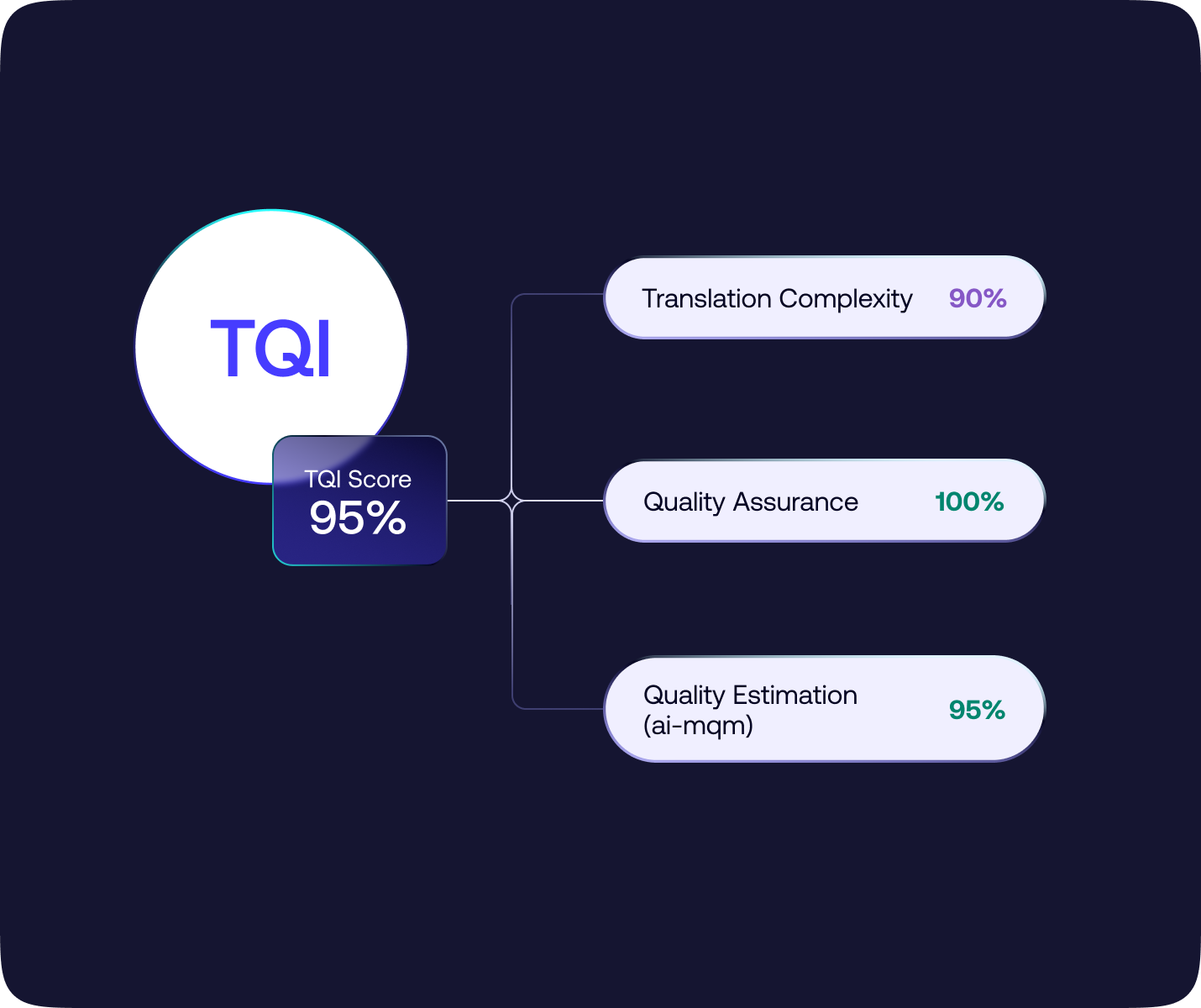
Live website translation
Install one JavaScript snippet and translate your website directly in the browser. See exactly how Italian text expansion affects buttons, menus, and content areas in real-time. Changes go live immediately without developer involvement—perfect for marketing campaigns targeting Italian-speaking markets across Europe and the Americas.
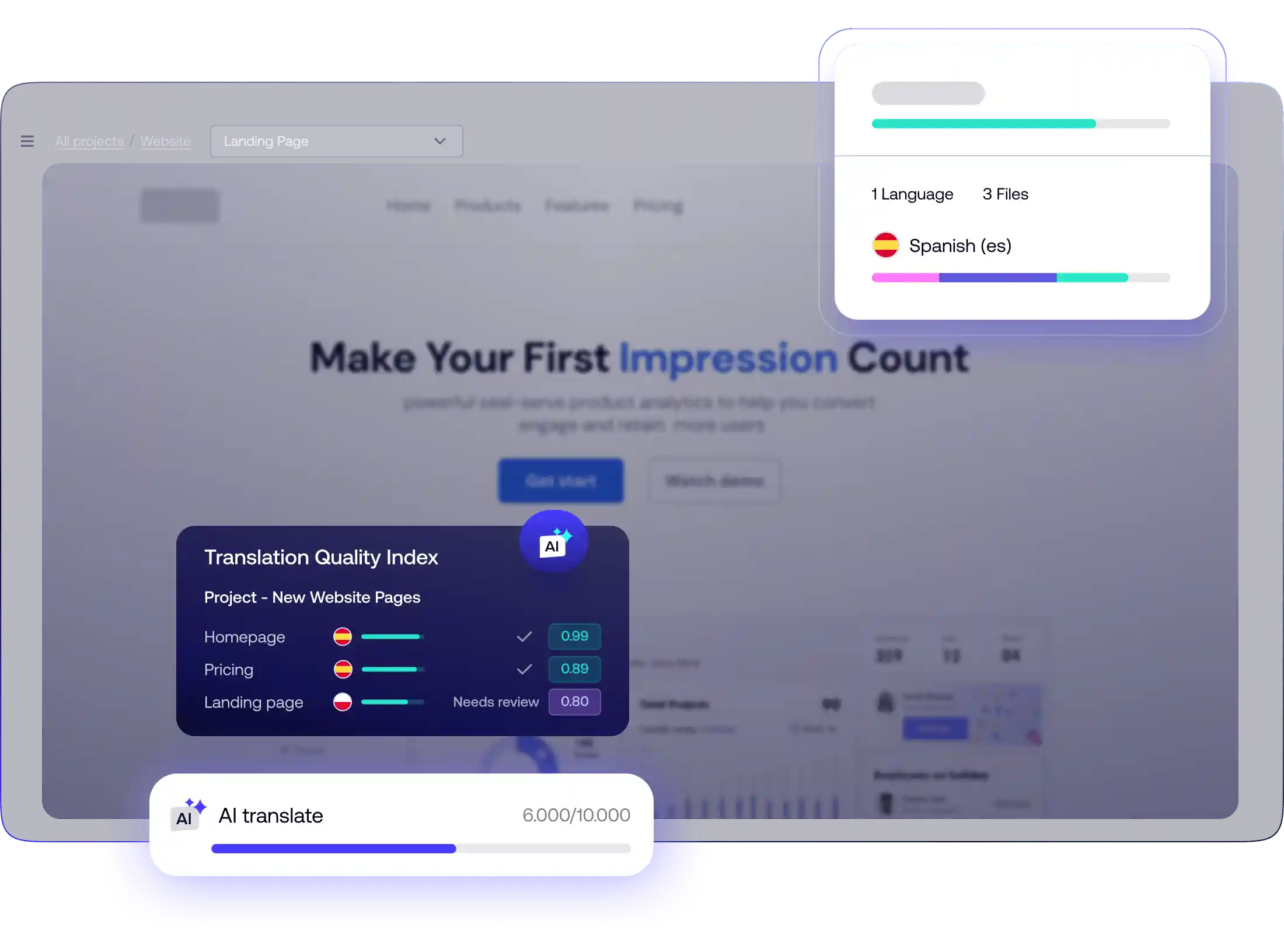




Built for product, marketing, and localization teams alike
Marketing Managers
Launch Italian campaigns faster
Create localized Italian content that matches your brand voice across Italy, Switzerland, and Italian diaspora communities. With context-aware translations, marketing teams can move fast, stay consistent, and never miss a campaign window targeting Italian-speaking audiences—no dev help required.
Developers
Italian localization built for agile teams
Take Italian localization off your backlog with a platform built for high-frequency content updates. Seamlessly integrate into your CI/CD workflow using our extensive API, SDKs, and CLI tools with full ISO standard compliance for Italian locale handling.
Product Teams
Launch multilingual products faster
Accelerate product launches with automated Italian localization. Integrate seamlessly into your development workflow and ensure your applications speak every Italian dialect from day one with proper locale handling for Italian-speaking regions.
Localization Managers
More efficiency, more localized Italian content
Localize more Italian content with less effort on an all-in-one platform. Bring all stakeholders together, streamline collaboration, and deliver authentic, on-brand Italian translations efficiently for every Italian-speaking market while maintaining ISO 17100:2015 quality standards.
AI translation that understands Romance language complexity
Transifex supports over 450 language locales following ISO 639-1 standards, including distinct Italian variants like it_IT (Italy), it_CH (Switzerland), it_SM (San Marino), and it_VA (Vatican City). The AI recognizes when to use "computer" vs "elaboratore" for computer, or "autostrada" vs "superstrada" for highway, depending on your specific Italian market.
Transifex features designed for Italian localization excellence:
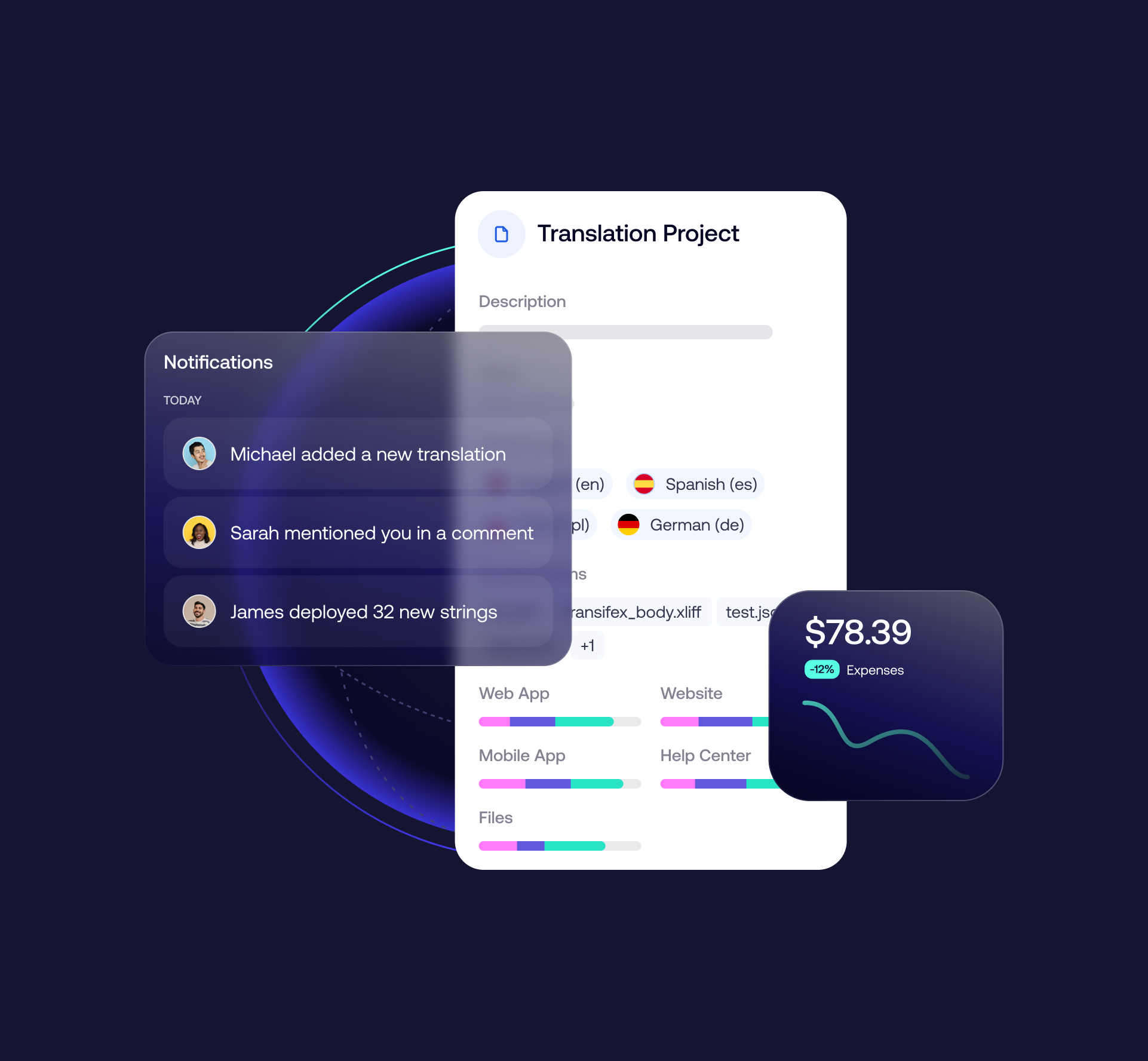
Complete project management
Set up automated workflows for Italian translation projects using Unicode CLDR data for proper pluralization handling. Configure TM fill-up to instantly apply 100% matches from your Italian translation memory. Enable AI fill-up to translate new content automatically while respecting Italian grammatical gender and verb conjugations. Assign roles to certified Italian translators, reviewers, and project managers with appropriate permissions for different Italian-speaking markets.
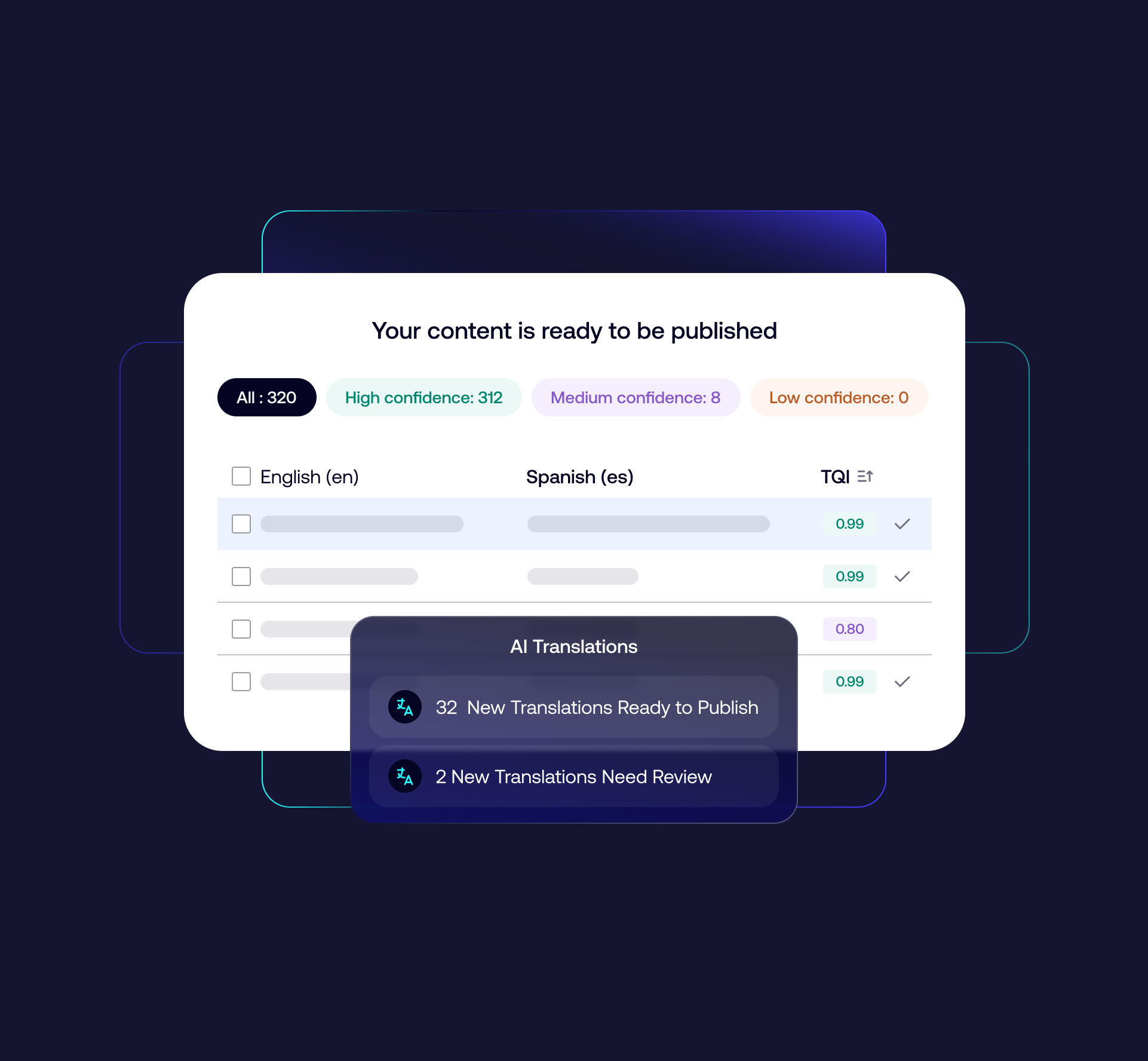
Context-aware AI translation
The system analyzes your Italian glossary for consistent terminology, references high-similarity translation memory entries, and follows your Italian style guide instructions. Whether you need formal business Italian for B2B documents or conversational Italian for consumer marketing, the AI adapts accordingly while maintaining brand consistency across Italian-speaking regions.
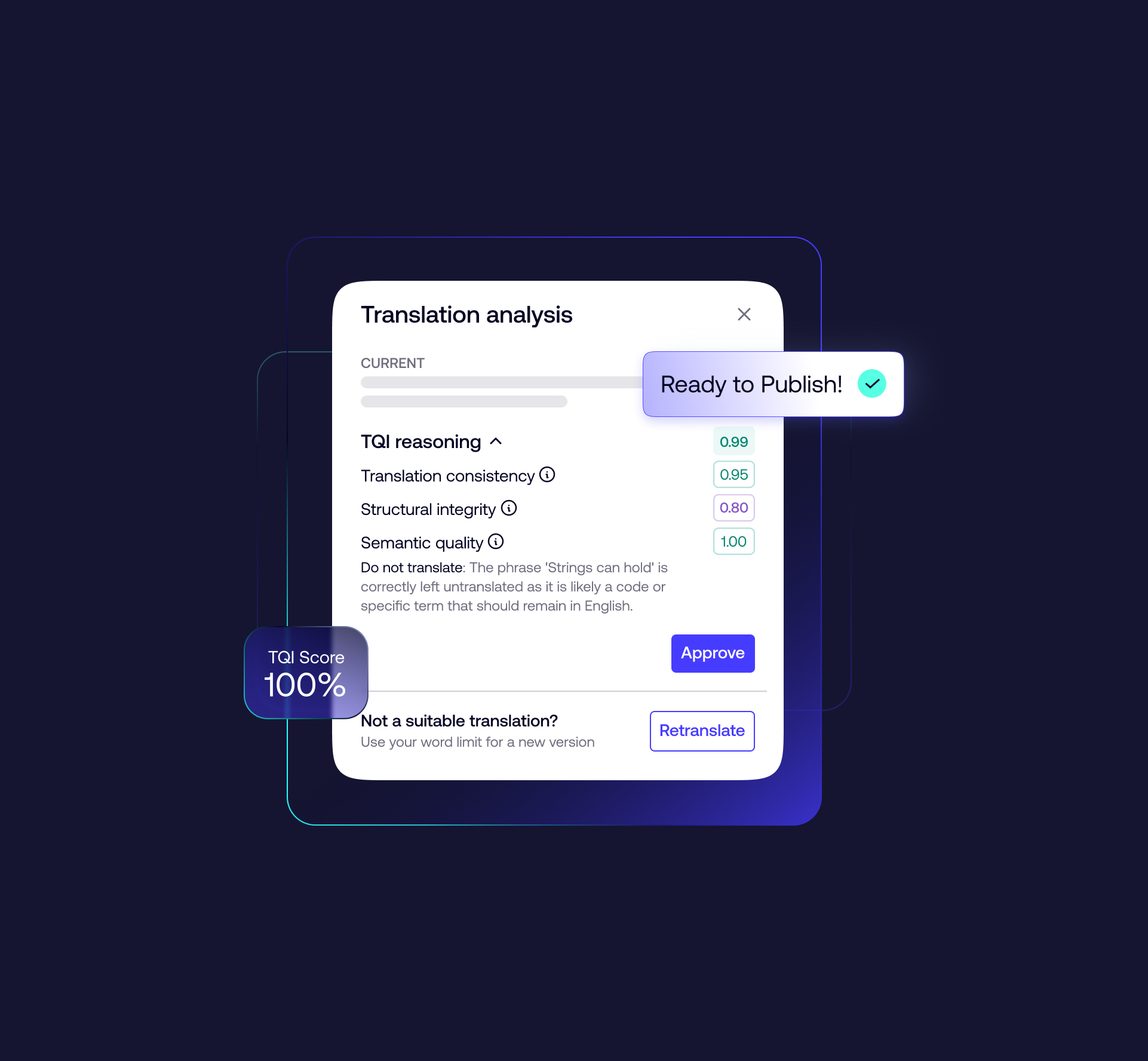
Automated quality control
TQI identifies specific issues like Italian grammar inconsistencies, gender agreement errors, or cultural appropriateness concerns for different Italian markets. Configure workflows to auto-approve high-scoring translations (85%+), route medium-scoring content for quick review by native Italian speakers, and flag low-scoring translations for comprehensive revision. Track quality trends to improve future Italian translations.
The only localization platform with native support for over 46 different content types
Translate any type of English content into Italian—no conversions or plugins needed.
Web and
mobile UI
YAML (.yaml/.yml), JSON (including structured JSON), Gettext PO/POT, Android XML, Apple .strings / .stringsdict—supports Italian text expansion handling
Technical documentation
Markdown (.md / .mdx), Wiki markup (.wiki), XLIFF (.xliff/.xlf/.xml)—perfect for Italian technical manuals
Marketing
assets
PowerPoint (.pptx), HTML / XHTML, Landing pages—handles Italian cultural adaptation automatically
Fileless (API-based content)
Phrase-based localization from APIs, Figma plugin, HubSpot—uses ICU syntax, supports Italian metadata, and exports as JSON or XLIFF
Business and legal documents
Microsoft Word (.docx), Excel (.xlsx/.xlsm/.xltx/.xltm), PDF (via conversion)—ideal for Italian legal compliance
Subtitles and video captions
SubRip (.srt), SubViewer (.sub), YouTube captions (.sbv), WebVTT (.vtt)—translated in-context with built-in editor preview for Italian voice-over projects

Scale Italian localization—without the headaches
Transifex helps you translate English to Italian with speed, precision, and automation—all while maintaining brand consistency and cutting manual work.
Launch new content, reach Italian-speaking markets, and scale your multilingual strategy with confidence across Italy, Switzerland, and global Italian communities.
Frequently asked English to Italian questions
Still got questions? Talk with the Transifex team to see how you can improve the quality of your Italian translations and save money.
How many people speak Italian globally?
Italian is spoken by approximately 85+ million people worldwide as a native language. Italy accounts for 67 million speakers, Switzerland has 500,000+ Italian speakers in Ticino and Grisons regions, and significant populations exist in the United States, Argentina, Australia, and other countries with Italian diaspora communities.
What's the difference between Italian dialects and Standard Italian?
Standard Italian (based on Tuscan dialect) is the official language used in business across all Italian-speaking countries. Regional dialects like Neapolitan, Sicilian, and Venetian exist but Standard Italian works for all business localization needs across Italy, Switzerland, San Marino, and Vatican City.
Why is Italian important for European business expansion?
Italian represents Europe's fourth-largest economy with a GDP exceeding $2 trillion and serves as a gateway to Mediterranean markets. Italy leads in fashion, manufacturing, automotive, and design industries, making Italian localization essential for European market penetration and luxury brand positioning.
How does Transifex handle Italian grammatical gender and verb conjugations?
Transifex AI understands Italian grammatical complexity including masculine/feminine noun genders, complex verb conjugations, and formal/informal address forms. The platform automatically handles grammatical agreements and suggests appropriate formality levels based on your business context and target audience.
What industries benefit most from English to Italian translation?
Fashion, automotive, manufacturing, food & beverage, tourism, and luxury goods industries see significant benefits from Italian localization. Italy's strength in design and manufacturing creates opportunities across technical documentation, marketing materials, and e-commerce platforms targeting sophisticated Italian consumers.
Can Transifex handle certified Italian translations for legal use?
Transifex supports professional Italian translation workflows that meet ISO 17100:2015 standards. Our platform enables certified Italian translators to work with legal documents, business contracts, and technical manuals while maintaining consistency and accuracy for Italian legal compliance.
How long does English to Italian translation take with Transifex?
Translation speed depends on content volume and complexity. Transifex AI provides instant Italian translations with TQI quality scoring, while human review processes can be automated based on quality thresholds. Most projects see 70% faster completion times compared to traditional workflows while maintaining native-level quality.
Learn more about scaling your software localization efforts
Software localization is more than the translation of your product UI. Different language settings, plural forms, frameworks used and visual relevancy factors are only a few other things to consider.




